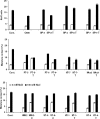Comparative study of wild and transformed salt tolerant bacterial strains on Triticum aestivum growth under salt stress
- PMID: 24031574
- PMCID: PMC3769755
- DOI: 10.1590/S1517-838220100004000013
Comparative study of wild and transformed salt tolerant bacterial strains on Triticum aestivum growth under salt stress
Abstract
Eleven salt tolerant bacteria isolated from different sources (soil, plants) and their transformed strains were used to study their influence on Triticum aestivum var. Inqlab-91 growth under salt (100 mM NaCl) stress. Salt stress caused reduction in germination (19.4%), seedling growth (46%) and fresh weight (39%) in non-inoculated plants. In general, both wild and transformed strains stimulated germination, seedling growth and fresh weight in salt free and salt stressed conditions. At 100 mM NaCl, Staphylococcus xylosus ST-1 caused 25% increments in seedling length over respective control. Soluble protein content significantly enhanced (49%) under salt stress as compared to salt free control. At 100 mM NaCl parental strain PT-5 resulted about 32% enhancement in protein content over respective control treatment. Salt stress induced the promotion of auxin content in seedlings. Overall, Bacillus subtilis HAa2 and transformed E. coli -SP-7-T, caused 33% and 30% increases in auxin content, respectively, were recorded under salt stress in comparison to control.
Keywords: Auxin; Plasmid; Rhizobacteria; Salinity; Transformation; Triticum aestivum.
Figures


References
-
- Afrasayab S., Hasnain S. Synergistic growth stimulatory effects of mixed culture bacterial inoculations on the early growth of Triticum aestivum under NaCl stress. Pak. J. Biol. Sci. 2000;6:1016–1023.
-
- Ali B., Sabri A.N, Ljung K., Hasnain S. Auxin production by plant associated bacteria: impact on endogenous IAA content and growth of Triticum aestivum L. Lett. Appl. Microbiol. 2009;48:542–547. - PubMed
-
- Aslam M., Qureshi R.H., Nawaz S., Akhtar J., Nasim M. Nat Wshop “Woodfuel production and marketing in Pakistan. Vol. 49. Faisalabad: Punjab Forestry Research Institute; 2000. Development of salt-affected wastelands for wood production in Pakistan; pp. 51–64. October 2730, 1997. Bangkok, FAO Regional Wood Energy Development Programme in Asia, RWEDP Rep.
-
- Bardavid R., Ionescu D., Oren A., Rainey F., Hollen B., Bagaley D., Small A., McKay C. Selective enrichment, isolation and molecular detection of Salinibacter and related extremely halophilic bacteria from hypersaline environments. Hydrobiologia. 2007;576:3–13.
LinkOut - more resources
Full Text Sources
